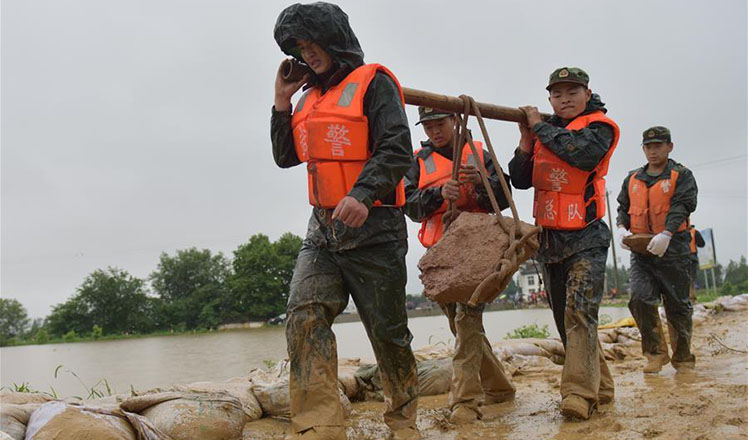Tribunal needs to correct its mistakes
Updated: 2016-07-07 08:09
By Sienho Yee(China Daily)
|
||||||||
 |
|
File photo of South China Sea. [Photo/Xinhua] |
The South China Sea arbitration unilaterally initiated by the Philippines against China in The Hague-based Permanent Court of Arbitration has violated many international standards of law and rules. To begin with, the arbitral tribunal does not properly identify or prove the existence of a real dispute. Also, the tribunal does not follow the world's principal legal systems.
The award on jurisdiction does not take proper cognizance of China's position. For example, China treats Nansha Islands as one single unit for the purpose of sovereignty, maritime rights as well as delimitation, but the tribunal has changed the singular "is" into the plural form "are", treating the islands and reefs in the Nansha Islands as separate units.
The award does not consider China's positions either, although it summarizes some of them superficially. For example, the tribunal summarizes China's argument that a 1995 joint statement saying the two countries would take measures with a view to "eventually negotiating" a settlement of their disputes as evincing an intent to choose negotiation only as the means to resolve disputes, but this point is absent from the part of the award called "the tribunal's decision".
Besides, the award accepts the Philippines' assertion without analyzing why its claims would not detract from China's sovereignty. The detraction is obvious from the treatment of the components of China's Nansha Islands as separate features, which would divide that archipelago into smaller units, and from a ruling that the low-tide elevations at issue, which are part of the Nansha Islands, are not subject to appropriation.
The award also superficially claims maritime entitlement and delimitation are distinct, without considering the delimitation of geographical framework and situation in the South China Sea and the associated effect of fusing distinct issues of entitlement and status of various features into a big delimitation complex, rendering these issues concerning delimitation.
Finally, the award does not respect the consistency requirement in international law. The tribunal completely ignores the "Louisa case", which is favorable to China and is directly applicable to the interpretation of China's exclusion of disputes "concerning" or "relating to" maritime delimitation as disputes over matters broader than the drawing of the line of delimitation. The arbitrator has completely changed, without offering any explanation, his previously published positions which were favorable to China. All this violates the fundamental requirement of consistency in international law and shows that the tribunal only pays lip service to its duties in arbitration.
The tribunal adopts an excessively expansive interpretation of the jurisdictional grant and distorts the text of the UN Convention on the Law of the Sea. This wrongful exercise of the "competence-competence" principle, which empowers an arbitration tribunal to rule on its jurisdiction, causes substantial damage to the international rule of law.
The competence to decide the tribunal's jurisdiction is not absolute power, and can only be exercised with genuine concern and respect for the limitations imposed by UNCLOS and for China's intents and purposes in invoking its explicit right under the convention to exclude disputes concerning maritime delimitation and historic titles.
This excessively expansive interpretation of the jurisdictional scope will present great difficulty in persuading other non-parties such as the United States to ratify UNCLOS in the future, because their greatest fear is that a court or tribunal may abuse its jurisdictional competence. This interpretation will also greatly harm the international legal system and its legitimacy.
If the tribunal and arbitrators are rational and serious, they should correct their mistakes and make up for what they have neglected to do. For example, they should correct their deliberate alteration of singular "is" used by China to describe the Nansha Islands into the plural "are", correct their mistake in not considering the delimitation geographical framework and situation in the South China Sea and the associated effect, and rectify their mistake of ignoring the rule of law requirement of consistency and in disregarding the word "concerning" in appreciating the proper scope of China's exclusion of disputes on or relating to maritime delimitation.
The author is a professor of international law and chief expert at Wuhan University Institute of Boundary and Ocean Studies.
- China Voice: South China Sea, a pseudo 'hot-spot issue'
- Cold war mentality lingers in South China Sea arbitration
- US must fight terrorism not meddle in South China Sea
- China, US need to manage differences over South China Sea: experts
- South China Sea: How we got to this stage
- South China Sea issue debate - from foreign politicians
- Why dual-track approach most effective to solve South China Sea disputes?
- Dai Bingguo: China not to be intimidated, even if US sends 10 aircraft carriers to South China Sea
- President Xi's remarks on South China Sea issue
- Eid al-Fitr celebrated worldwide
- Swedish PM looking at tightening laws after festival sex attacks
- British PM race cut to 3 hopefuls as 2 contenders exit contest
- Chinese herbalists offer free US treatment
- Obama praises Hillary's judgement hours after FBI's censure
- Rio mayor tells Olympic visitors: 'Don't expect New York or London'

 Solar-powered visitor begins orbiting Jupiter
Solar-powered visitor begins orbiting Jupiter
 Continuous rainfalls affect millions of people across China
Continuous rainfalls affect millions of people across China
 Chinese foodies' top 10 favorite restaurants
Chinese foodies' top 10 favorite restaurants
 Chinese basketball legend Wang Zhizhi bids farewell
Chinese basketball legend Wang Zhizhi bids farewell
 Iceland soccer team gets hero's welcome back home
Iceland soccer team gets hero's welcome back home
 Power giant Hanergy shows its solar concept cars
Power giant Hanergy shows its solar concept cars
 Murray downs Kyrgios; Serena powers into quarters
Murray downs Kyrgios; Serena powers into quarters
 Nanjing's Linggu temple offers best view of fireflies
Nanjing's Linggu temple offers best view of fireflies
Most Viewed
Editor's Picks

|

|

|

|

|

|
Today's Top News
Abe's blame game reveals his policies failing to get results
Ending wildlife trafficking must be policy priority in Asia
Effects of supply-side reform take time to be seen
Chinese State Councilor Yang Jiechi to meet Kerry
Chinese stocks surge on back of MSCI rumors
Liang avoids jail in shooting death
China's finance minister addresses ratings downgrade
Duke alumni visit Chinese Embassy
US Weekly

|

|








